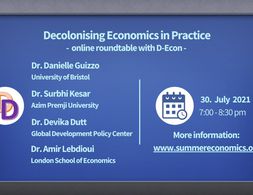✕
434 results
Since the 1980s, the financial sector and its role have increased significantly. This development is often referred to as financialization. Authors working in the heterodox tradition have raised the question whether the changing role of finance manifests a new era in the history of capitalism. The present article first provides some general discussion on the term financialization and presents some stylized facts which highlight the rise of finance. Then, it proceeds by briefly reviewing the main arguments in the Marxian framework that proposedly lead to crisis. Next, two schools of thought in the Marxian tradition are reviewed which consider financialization as the latest stage of capitalism. They highlight the contradictions imposed by financialization that disrupt the growth process and also stress the fragilities imposed by the new growth regime. The two approaches introduced here are the Social Structure of Accumulation Theory and Monthly Review School. The subsequent part proceeds with the Post-Keynesian theory, first introducing potential destabilizing factors before discussing financialization and the finance-led growth regime. The last section provides a comparative summary. While the basic narrative in all approaches considered here is quite similar, major differences stem from the relationship between neoliberalism and financialization and, moreover, from the question of whether financialization can be considered cause or effect.
Podcast series with six 12-minute parts introducing the the values and ideas behind our neoliberal economic system: where it came from, how it spread, and how we could do things differently.
Global Value Chains (GVCs) started to play an increasing and key role in the global economy from the 1990s on. The market mechanism in GVCs supports industrialisation in the Global South and under certain conditions product and process upgrading. But GVCs do not lead to the catching-up of countries in the sense of them approaching real GDP per capita levels comparable with developed countries. These arguments are supported by a critical interpretation of the traditional trade theory, the New Trade Theory and specific approaches to explain GVCs, especially different governance structures and power relationships. Several case studies support these arguments. For catching-up, countries need comprehensive horizontal and vertical industrial policy and policies for social coherence. The small number of countries which managed to catch up did this in different variations.
This paper presents an overview of different models which explain financial crises, with the aim of understanding economic developments during and possibly after the Great Recession. In the first part approaches based on efficient markets and rational expectations hypotheses are analyzed, which however do not give any explanation for the occurrence of financial crises and thus cannot suggest any remedies for the present situation. A broad range of theoretical approaches analyzing financial crises from a medium term perspective is then discussed. Within this group we focused on the insights of Marx, Schumpeter, Wicksell, Hayek, Fisher, Keynes, Minsky, and Kindleberger. Subsequently the contributions of the Regulation School, the approach of Social Structures of Accumulation and Post-Keynesian approach, which focus on long-term developments and regime shifts in capitalist development, are presented. International approaches to finance and financial crises are integrated into the analyses. We address the issue of relevance of all these theories for the present crisis and draw some policy implications. The paper has the aim to find out to which extent the different approaches are able to explain the Great Recession, what visions they develop about future development of capitalism and to which extent these different approaches can be synthesized.
Exploring Economics, an open-source e-learning platform, giving you the opportunity to discover & study a variety of economic theories, topics, and methods.
Pluralism includes mainstream economics. Our campaign for pluralism, including this series, have generally focused on ideas outside the mainstream on the basis that it gets plenty of attention already so we want to spend our time exposing people to alternatives. Nevertheless, mainstream ideas deserve some attention. On top of this, a curious feature of modern economics education is that some of the best ideas from mainstream economics are not even taught to undergraduates! During this series I will explore such ideas, starting today with the market construction technique known as ‘matching’.
In this paper the main developments in post-Keynesian macroeconomics since the mid- 1990s will be reviewed. For this purpose the main differences between heterodox economics in general, including post-Keynesian economics, and orthodox economics will be reiterated and an overview over the strands of post-Keynesian economics, their commonalities and developments since the 1930s will be outlined. This will provide the grounds for touching upon three important areas of development and progress of post-Keynesian macroeconomics since the mid-1990s: first, the integration of distribution issues and distributional conflict into short- and long-run macroeconomics, both in theoretical and in empirical/applied works; second, the integrated analysis of money, finance and macroeconomics and its application to changing institutional and historical circumstances, like the process of financialisation; and third, the development of full-blown macroeconomic models, providing alternatives to the mainstream 'New Consensus Model' (NCM), and allowing to derive a full macroeconomic policy mix as a more convincing alternative to the one implied and proposed by the mainstream NCM, which has desperately failed in the face of the recent crises.
In spite of the manifold critique about the state of economics in the aftermath of the financial crisis, an even increasing presence of economists and economic experts can be observed in the public sphere during the last years. On the one hand this reflects the still dominant position of economics in the social sciences as well as the sometimes ignorant attitude of economists towards findings of other social sciences. On the other hand this paper shows that the public debate on politico-economic issues among economists is dominated by a specific subgroup of economists, tightly connected to an institutional network of “German neoliberalism”. This group of “public economists” (i) is dominant in public debates even after the financial crisis, (ii) reproduces the formative German economic imaginary of the Social Market Economy in a German neoliberal interpretation and (iii) has a good access to German economic policymaking, rooted in a long history of economic policy advice.
The article compares market fundamentalism and right-wing populism on the basis of its core patterns of thinking and reasoning. Based on an analysis of important texts in both fields we find many similarities of these two concepts in their "inner images". Thus, we develop a scheme of the similar dual social worlds of right-wing-populism and market fundamentalism and offer some recent examples of market fundamentalism and right-wing populism mutually reinforcing each other or serving as a gateway for each other. We then apply our scheme for the analysis of the recent political developments and its ideological roots in the US under Donald Trump.
Exploring Economics, an open-source e-learning platform, giving you the opportunity to discover & study a variety of economic theories, topics, and methods.
Exploring Economics, an open-source e-learning platform, giving you the opportunity to discover & study a variety of economic theories, topics, and methods.
Could the Brazilian measures of income support carried out during 2020 be considered one way towards UBI? This questions is broadly addressed in the video.
This Perspective argues that ergodicity — a foundational concept in equilibrium statistical physics — is wrongly assumed in much of the quantitative economics literature. By evaluating the extent to which dynamical problems can be replaced by probabilistic ones, many economics puzzles become resolvable in a natural and empirically testable fashion.
Modern authors have identified a variety of striking economic patterns, most importantly those involving the distribution of incomes and profit rates. In recent times, the econophysics literature has demonstrated that bottom incomes follow an exponential distribution, top incomes follow a Pareto, profit rates display a tent-shaped distribution. This paper is concerned with the theory underlying various explanations of these phenomena. Traditional econophysics relies on energy-conserving “particle collision” models in which simulation is often used to derive a stationary distribution. Those in the Jaynesian tradition rely on entropy maximization, subject to certain constraints, to infer the final distribution. This paper argues that economic phenomena should be derived as results of explicit economic processes. For instance, the entry and exit process motivated by supply decisions of firms underlies the drift-diffusion form of wage, interest and profit rates arbitrage. These processes give rise to stationary distributions that turn out to be also entropy maximizing. In arbitrage approach, entropy maximization is a result. In the Jaynesian approaches, entropy maximization is the means.
Exploring Economics, an open-access e-learning platform, giving you the opportunity to discover & study a variety of economic theories, topics, and methods.
The current Great Recession, the worst crisis that capitalism has faced since the Great Depression, has failed, at least so far, to generate a change in the teaching and practice of Macroeconomics. This seems bizarre as if nothing has happened and the economists are just going about doing business as usual. In light of this, the current paper attempts to address how Macroeconomics ought to be taught to students at the advanced intermediate level, which gives them an overall perspective on the subject.
This brief note explores the possibility of working towards an enlarged self-definition of economics through economists’ study and appreciation of economic sociology. Common ground between economic sociology and heterodox economics is explored, and some of Richard Sennett’s ideas are used as prompts to raise some pertinent and hopefully interesting questions about economics. In particular, the note revisits the question of whether there is a possibility of changing our understanding of what kind of social scientific work falls within the domain of economics proper once we start critically engaging with work conventionally considered to be outside of that domain. In part, the note is intended to offer undergraduate students in economics – and possibly even those further down the road in their education – food for thought about what constitutes economics.
This paper surveys the development of the concept of socialism from the French Revolution to the socialist calculation debate. Karl Marx’s politics of revolutionary socialism led by an empowered proletariat nurtured by capital accumulation envisions socialism as a “top-down” system resting on political institutions, despite Marx’s keen appreciation of the long-period analysis of the organization of social production in the classical political economists. Collectivist thinking in the work of Enrico Barone and Wilfredo Pareto paved the way for the discussion of socialism purely in terms of the allocation of resources. The Soviet experiment abandoned the mixed economy model of the New Economic Policy for a political-bureaucratic administration of production only loosely connected to theoretical concepts of socialism. The socialist calculation debate reductively recast the problem of socialism as a problem of allocation of resources, leading to general equilibrium theory. Friedrich Hayek responded to the socialist calculation debate by shifting the ground of discussion from class relations to information revelation
Exploring Economics, an open-access e-learning platform, giving you the opportunity to discover & study a variety of economic theories, topics, and methods.
A remarkable and insightful tribute into the works of late Malawian development economist, Professor Thandika Mkandawire. Must read for anyone looking to broaden their scope of understanding development as it relates to the African continent.
This is an introductory level core course in macroeconomics for those expecting to take further courses in economics. It provides a theoretical and applied approach of introductory macroeconomics, with an international perspective and applications to account for the growing importance of the global economy and the rising openness of economies.
Fighting Neoliberalism with Keynes & Minsky? Riccardo Bellofiore proposes to revise the insights of Minsky's financial instability hypothesis, combining it with the Keynesian theory of the monetary circuit to answer many questions in modern economy.
This course introduces students to political economy and the history of economic thought. We will cover the core ideas in various schools of economic thought, positioning them in the historical and institutional context in which they were developed. In particular, we will cover some economic ideas from the ancient world and the middle ages; the enlightenment; the emergence of and main ideas in classical political economy (Adam Smith, David Ricardo, Thomas Malthus, and others); Marx, Mill, and Keynes; European versus American economic thought through history; the rise of mathematical economics; economic theories around state-managed economies versus socialism; Austrian economics; behavioral economics; and the future of economics.
This course will introduce key concepts, theories and methods from socioeconomics. The first part of the course, will deal with the main economic actors and how their interactions are governed. Markets are seen as sets of social institutions. Institutions shape how consumers, firms and other economic actors behave. While it is difficult to understand how novelty emerges, we can study the conditions that are conducive to innovation. We will review how economic performance, social progress and human wellbeing are measured and what progress has been made. In the second part of the course, we will study a specific macroeconomic model that accounts for biophysical boundaries and inequality.
The workshop introduces into the field of critical political economy and tries to identify the role of finacial markets in capitalism, the reason for financial crises and the relevance of Marx in regard to these topics.
This course focus on the behaviour of individuals from an pluralist economic and an interdisciplinary bevavioural science apprach.
South Africa’s taxi industry was established by black people in the 1930s and has faced numerous challenges, including those posed by decades of apartheid laws. Covid-19 has highlighted contemporary challenges facing the industry and has also raised questions about how it can keep ‘driving forward’. This podcast explores questions such as what changes need to be made, and who can be the ‘drivers’ of such change.
Exploring Economics, an open-access e-learning platform, giving you the opportunity to discover & study a variety of economic theories, topics, and methods.
Exploring Economics, an open-access e-learning platform, giving you the opportunity to discover & study a variety of economic theories, topics, and methods.
This course will survey contemporary heterodox approaches to economic research, both from a microeconomic and a macroeconomic perspective. Topics will be treated from a general, critical, and mathematical standpoint.
Recent events such as the Black Lives Matter protests the the murder of George Floyd in Minneapolis US and the toppling of the statue of Edward Colston in Bristol UK have exposed existing racism colonialism and sexism in our society and in Economics While calls to improve diversity in Economics …
After a brief illustration of sovereign green bonds’ features, this paper describes the market evolution and identifies the main benefits and costs for sovereign issuers. The financial performance of these securities is then analysed.
We use cookies on our website. Click on Accept to help us to make Exploring Economics constantly better!

























